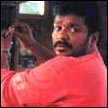
|
Clever lines, but something of a wet dishrag
Actor-producer-director Parthipan's Ivann seems to have lost focus
|
Tulika
'If they offer you an Assembly seat, will you stand?'
'If they offer me a seat, why should I stand?'
Did we hear a groan? The above is a quick introduction to a form of pun-based humour that Tamil Nadu has elevated to the status, almost, of art form. And onscreen, actor-producer-director Parthipan is one of its leading exponents.
So going for a Parthipan film, you know you will get a lot of clever lines --- most of them with a rather hard-hitting political or social
undercurrents.
What else do you get in Ivann, Parthipan's latest?
You get the story of Jeevan (Parthipan), a socially-conscious young man whose father (Thalaivasal Vijay) was 'murdered' for attempting to crusade against society's ills. The tragedy turns Jeevan into a crusader hell bent on cleaning up society. He is intelligent enough to realise that a one-man army cannot really fight evil. So he sets out to motivate the public to do their own fighting, for the rights that are being denied them.
Jeevan and four friends thus live together, doing what they can to improve conditions in their locality. Carnatic singer Dikshanya (Soundarya) is a silent admirer, but Meena Kumari (Meena) is the one who, through subterfuge, gets him to marry her. The story weaves through assorted villainy until the climax, where all the bad guys come together to hear a lecture from the hero that brings about a change of heart.
Oh well.
It is one of Tamil cinema's pet themes --- clean up society. You sometimes wonder where it is all coming from. Is it the internal angst of the moviemakers finding cinematic expression or is it that the moviemakers, recognising the amount of angst among the public, look to cash in on these individual-against-the-system movies?
Whatever, one problem is that of plenty. There are just too many of these films being churned out. And pretty soon, it all becomes much of a muchness, with nothing really new being said. The theme remains the same, at best it is the subtext that changes.
The subtext, here, is Parthipan's telling the people not to wait for the 'saviour' to take birth or come floating down from the sky like a divine avtar. If you want to do something, you have to do it yourself.
Instant and immediate punishment --- vide the chain-snatcher scene --- is a favourite Parthipan theme. It makes sense if you look at it from the point of view of the filmmaker --- Parthipan is a self-confessed atheist, therefore he is unlikely to buy the theory of divine retribution.
The problem though is that in his attempt to be hard-hitting, direct, gut-wrenching, he goes over the top and ends up on the wrong side of 'gross'.
Another Tamil stable in recent years is the two-heroine tactic. Typically, the woman does the wooing --- the guy just stands back, not giving the girl(s) any reason to fall in love with him. But they just can't help it, see?
The late M G Ramachandran on, Tamil marquee idols have gone for this in a big way. Here, Soundarya is the singer for whom Parthipan plays chauffeur once. He appreciates her singing, sends her some poems he scribbled --- and she falls. Then she gives up singing.
Meanwhile, Meena has inveigled him into marriage, but then conveniently dies --- talk of having your cake and eating it, too.
Parthipan has written the story and screenplay, produced the film, directed it, acted in it --- perhaps these multiple responsibilities caused a certain loss of focus.
Where acting goes, he is his usual relaxed self --- you cannot fault his acting or his trademark dialogue delivery. But the story is weak and vacillating, the sets are tacky.
Soundarya is very elegant and expressive. Meena's character is loud, and she plays it loud.
Music, by maestro Ilayaraja, is a definite plus. Sudha Raghunathan playbacks for Soundarya's Carnatic singer. There is the racy number Thool thool, and a very nice romantic one in Appadi paakrithana.
Cinematography is by Fouzia Pradeep --- the latest in an emerging line of female cinematographers. B R Vijayalaskhmi was the first --- Suhasini Mani Ratnam had trained for it, but never actually wielded the camera, she only assisted cinematographers before getting her first onscreen role.
Fouzia's recent credit is Mitr --- where she was part of producer-director-actress Revathy's all-woman crew. In this film, she is competent, living up to the standards set by Tamil cinematography in recent times. There is, in fact, a difficult stunt sequence filmed very impressively.
Overall, though, the film has something of the wet dishrag about it.